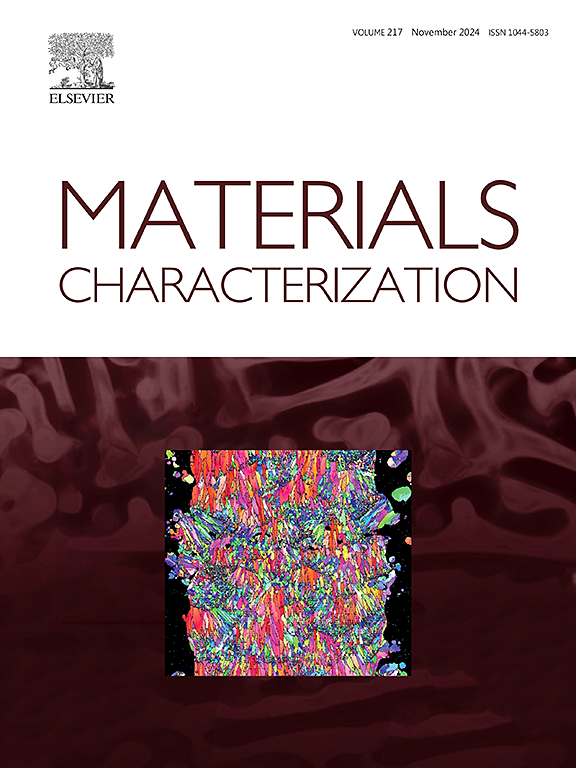Microstructural evolution and high strain rate deformation response of SLM-printed CoCrFeMnNi after annealing and deep-cryogenic treatment
IF 5.5
2区 材料科学
Q1 MATERIALS SCIENCE, CHARACTERIZATION & TESTING
引用次数: 0
Abstract
This study examines the microstructural evolution and high strain rate deformation response of Selective Laser Melted (SLM) CoCrFeMnNi high-entropy alloys (HEAs) after annealing and deep cryogenic treatment. Annealing treatment has traditionally improved the ductility of SLM materials. However, in this work, a significant improvement in strength was observed in the annealed SLM CoCrFeMnNi after high strain rate deformation testing. TEM/HRTEM investigations revealed the formation of refined oxides, generated from the processing chamber environment and constituent powder feedstock. These oxides were homogenously distributed within microstructure, reinforcing its structural integrity. Initial microstructural analysis of the as-printed samples showed Mn2O3 oxides sparsely distributed within a cellular dislocation structure and significant Mn segregation. Unique grain growth with a less prominent cellular dislocation structure was observed in the annealed specimen. Deep cryogenic treatment induced oriented cellular structures with higher dislocation density and rounded oxides that were 56 % smaller. High strain rate impact tests (up to 6500 s-1) demonstrated that the as-printed sample was sensitive to the strain rate and reached a yield strength of ∼920 MPa at 6000 s−1 and a strain deformation of ∼55 % making it desirable for high strain rate applications. Remarkably, up to 22 % higher strength and ∼10 % greater ductility were achieved after annealing. The strengthening mechanisms in the samples and their contributions to the overall material strength were thoroughly analyzed. It was determined that a substantial portion of the strength in the annealed samples was due to the contributions of the precipitates within the alloy. The observed increase in strength was primarily attributed to the presence of two distinct nano-precipitates in the annealed specimens. However, there was no change in ductility after the deep cryogenic treatment but ∼10 % higher yield strength values at equivalent strain rates also attributed to the increased dislocation density.
退火和深冷处理后 SLM 打印钴铬铁镍的微结构演变和高应变速率变形响应
本研究探讨了选择性激光熔化(SLM)钴铬铁镍高熵合金(HEAs)退火和深冷处理后的微观结构演变和高应变速率变形响应。传统上,退火处理可提高 SLM 材料的延展性。然而,在这项工作中,退火 SLM CoCrFeMnNi 在经过高应变率变形测试后,强度有了显著提高。TEM/HRTEM 研究显示,在加工室环境和组成粉末原料中形成了精炼氧化物。这些氧化物均匀地分布在微观结构中,加强了结构的完整性。对压印样品进行的初步微观结构分析表明,Mn2O3 氧化物稀疏地分布在蜂窝状位错结构中,并存在明显的锰偏析。在退火试样中观察到独特的晶粒生长和不太突出的蜂窝状位错结构。深度低温处理诱导出具有较高位错密度的定向晶胞结构和体积小 56% 的圆形氧化物。高应变速率冲击试验(高达 6500 s-1)表明,印刷后的样品对应变速率很敏感,在 6000 s-1 时屈服强度达到 920 兆帕,应变变形达到 55%,因此非常适合高应变速率应用。值得注意的是,退火后的强度提高了 22%,延展性提高了 10%。对样品中的强化机制及其对材料整体强度的贡献进行了深入分析。结果表明,退火样品强度的很大一部分是由合金中的析出物造成的。观察到的强度增加主要归因于退火试样中存在两种不同的纳米沉淀物。然而,深度低温处理后延展性没有变化,但在同等应变速率下屈服强度值提高了 10%,这也归因于位错密度的增加。
本文章由计算机程序翻译,如有差异,请以英文原文为准。
求助全文
约1分钟内获得全文
求助全文
来源期刊

Materials Characterization
工程技术-材料科学:表征与测试
CiteScore
7.60
自引率
8.50%
发文量
746
审稿时长
36 days
期刊介绍:
Materials Characterization features original articles and state-of-the-art reviews on theoretical and practical aspects of the structure and behaviour of materials.
The Journal focuses on all characterization techniques, including all forms of microscopy (light, electron, acoustic, etc.,) and analysis (especially microanalysis and surface analytical techniques). Developments in both this wide range of techniques and their application to the quantification of the microstructure of materials are essential facets of the Journal.
The Journal provides the Materials Scientist/Engineer with up-to-date information on many types of materials with an underlying theme of explaining the behavior of materials using novel approaches. Materials covered by the journal include:
Metals & Alloys
Ceramics
Nanomaterials
Biomedical materials
Optical materials
Composites
Natural Materials.
 求助内容:
求助内容: 应助结果提醒方式:
应助结果提醒方式:


